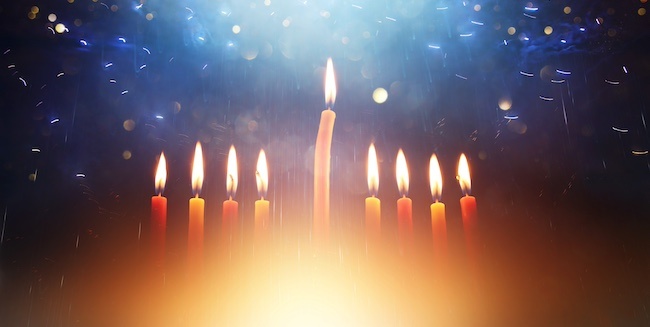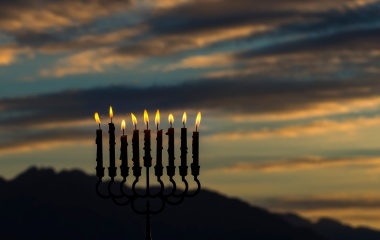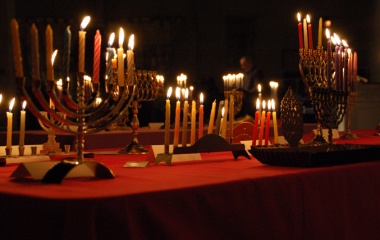
"The mitzvah of kindling Chanukah lamps is a very beloved mitzva” (Laws of Chanukah 4:12). So writes the Rambam living in the 12th century. Of course, it is beloved. Unlike Pesach it requires very little hard work and preparation in advance[1]; we celebrate with food, games, singing and highlight the powerful symbol of light. And this before we note that the Rambam lived under Islamic rule. Add in the influence of the Christmas season with its emphasis on gift giving and unsurprisingly Chanukah is amongst the most celebrated of Jewish holidays. Even many Jews who are intermarried and otherwise assimilated (who may even have a so-called Chanukah bush[2]) will light candles – the key mitzva of the holiday – even as they may celebrate and observe Christmas with their non-Jewish partner and family[3].
The Rambam then and thus rules that, “a person should be very careful [regarding lighting] in order to publicize the miracle and add to our praise of G-d and our expression of thanks for the miracles which He wrought on our behalf”.
It is for this reason that Chanukah candles were meant to be lit outside where the greatest number of people – Jews and non-Jews alike – will see the Menorah and be made aware of the miracles of Chanukah.
And while candles are generally lit indoors today (at least in Canada) I think it is fair to say that your typical non-Jew does have an awareness of Chanukah and even if many individuals do not, Chanukah is part of the cultural milieu, part of the holidays season. There is something heart-warming when non-Jewish with whom I interact at this time of year will often wish me a Happy Chanukah.
So important is lighting the Chanukiah that the Rambam writes that “Even if a person has nothing to eat except from charity, he should borrow or sell his garments and purchase oil and lamps and light”.
Yet in the very next halacha, the very last of the laws of Chanukah and the last law of all the holidays, the Rambam rules that if one has only enough money for ner beito, to light his home or to light Chanukah candles, lights for the home come first. In other words, it is more important to pay the electricity bill than to light Chanukah candles. Performing mitzvot is nice but basic necessities come first[4].
As the Rambam explains, one needs light in order to have shalom bayit, a peaceful and harmonious home. To live in darkness is a recipe for disputes, danger and disaster. The Rambam continues noting that "we erase G-d’s name in order to bring peace between a husband and wife[5].Great is peace for the entire Torah was given in order to bring peace to the world as it says (Mishlei 3:17) ‘Its ways are pleasant ways and all its paths are peace’" (Laws of Chanukah 4:14).
This is an amazing and crucial concept. The entire Torah – shabbat, kashrut, mezuzah, paying workers on time, torts, contract law, mikvah, fasting on Yom Kippur and more and more – is for the purpose of bringing peace to the world.
This is why Hillel, when asked by a potential convert to teach the Torah while he stood on one foot, could say “what is hateful to you do not do to others, all the rest [i.e. shabbat kashrut, Yom Kippur etc.] is commentary, go and learn” (Shabbat 31a) and why Rabbi Akiva could teach that “love your neighbour as yourself” is the fundamental principle of the Torah.
It is for good reason we recite this verse whenever we put back a sefer Torah to the aron kadosh. Regardless of what Torah portion we read the takeaway message is we must do our utmost to bring peace to the world.
The Rambam begins the Laws of Chanukah by detailing the war that the Chasmoneans were forced to fight. War is terrible. At times it is sadly and tragically necessary. But if the Torah allows, and at rare times even demands, war that means that the goal of every war must be to bring peace.
As Chanukah comes to an end may we merit that all wars will soon end and we be able to properly observe the Torah, the Torah in which “Its ways are pleasant ways and all its paths are peace".
[1] Yet at the same time I recall seeing Rabbi Lord Jonathan Sacks note that Pesach and Yom Kippur – two of the hardest holidays to observe – are also two of the most widely observed. There are many factors beyond ease and hardship that determine human activity – yet there is no doubt that in general human nature is to prefer what is easiest.
[2] I don’t know whether we should laugh or cry when the Canadian government recently announced a sales tax holiday on holiday spending exempting restaurant meals, toys and the like, including both Christmas trees and Chanukah bushes.
[3] While this can be viewed as a tragedy one can also view this with some hope and as an opportunity. Even those who are highly assimilated and at great risk of being lost to the Jewish people maintain a link to traditional practice. With Chanukah the holiday of hope ordained by the rabbis as the long exile was about to begin (see here) we must nurture and plant seeds wherever the smallest spark of Judaism flickers.
[4] As a general rule regarding positive mitzvot one needs to spend up to 20% of one’s income to perform the mitzva but no amount of money allows one to violate a negative commandment. Such violation is allowed only for health reasons.
[5] The Rambam is referring to the law of the Sotah, the tragic case where not without reason a husband suspects his wife of having had an affair and the wife protests that she is innocent. The Torah prescribes that parts of the Torah containing the name of G-d be erased, mixed with water and drunk by the wife. (See Bamidbar chapter 5).
The devar Torah is sponsored in honour of the recent marriage of Naomi Stochinsky and Michi Ellert in Israel. Mazal-Tov to the extended families. May the young couple build a beautiful Jewish home, a bayit ne'eman b'Yisrael, bYisrael.



